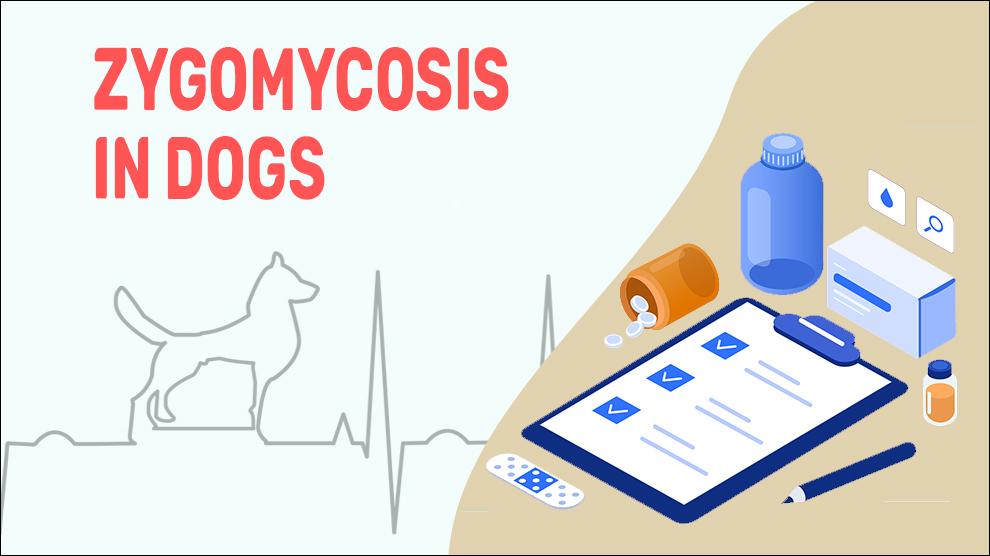What Is Zygomycosis In Dogs?
Zygomycosis is an umbrella term for rare infections caused by a group of environmental saprophytes of orders Entomophthorales and Mucorales (class Zygomycetes). They belong to a class of Glomeromycetes species which also causes lagenidiosis, zygomycetes, and pythiosis. Mucor, Absidia, Conidiobolus, Mortierella, Lichtheimia, and Rhizopus are the most common fungi in this group.
The ubiquitous fungus is alleged to be an opportunistic parasite and dogs that have compromised or suppressed immune systems are highly vulnerable. In affected dogs, GI tract involvement is reported in 40% of cases and the most frequently involved site is the stomach, followed by the small intestine, colon, and esophagus.
This disease is also called mucormycosis, entomophthoromycosis, or phycomycosis. The clinical presentation of Zygomycosis is broad-based on the underlying immunosuppression of the host and there exists overlapping. The clinical presentation of Zygomycosis can be broadly grouped into: gastrointestinal, pulmonary, rhinocerebral, cutaneous, disseminated, and other rare presentations.
Typically, zygo infections occur when the fungus enters the organ and vascular invasion with thrombosis occurs with hemorrhagic or ischemic infarction of the involved organ. The decreased flow of blood results in necrosis, causing widespread damage to the tissues. If not diagnosed properly and treated appropriately, further fungal development can occur with fatal consequences.
Symptoms Of Zygomycosis In Dogs
Treatment Options For Zygomycosis In Dogs
Zygomycosis treatment sometimes requires long-term medications (2-5 months in most cases)
Azole antifungals: Voriconazole, posaconazole, itraconazole, ketoconazole, and fluconazole
Voriconazole: Vfend
Posaconazole: Noxafil
Itraconazole: Sporanox, Itrafungol, Onmel
Ketoconazole: Nizoral. Ketoconazole costs less than the other azole antifungals)
Fluconazole: Diflucan
Home Remedies For Zygomycosis In Dogs
- Mix Apple Cider Vinegar with equal amounts of water and massage the dog’s coat. on the other hand, you can use oregano oil, colloidal silver, or tea tree oil
- Foods that fight yeast Infections: treats containing olive leaf, caprylic acid, and Pau D-Arco
- Never forget to add Probiotics foods to your dog’s meal
How To Prevent Zygomycosis In Dogs?
- Unfortunately, we cannot get rid of these parasites from the environment as they are Prevalent
- When going for walks with your dog, avoid microbial Hotspots such as foliage-filled areas, wooded areas, and other decayed substances in the woods
- Keep your lawn or garden clean. Make sure to dispose carefully of swarming waste bins and trash in the backyard
- Ask experts for good quality flea, pests, and tick preventatives
Affected Dog Breeds Of Zygomycosis
There is no breed disposition
‘Dolichocephalic’ dogs (dogs with long noses) are highly susceptible
Causes And Prognosis For Zygomycosis In Dogs
1. Causes:
These saprophytic funguses are ubiquitous and can thrive in compost piles, stored grains, decomposing vegetation, or animal excreta.
When your dog roams outdoors, they get easily get transmitted to the dog through its skin and/or fur. The fungus produces a large number of airborne microscopic spores that float in the air to infect a host through ingestion, inhalation, contamination, or inoculation.
2. Mortality:
Disseminated cases of zygomycosis are fatal. When not treated properly, it can result in severe complications.
3. Diagnosis:
- Complete blood count (CBC), blood chemistry profile
- Electrolyte panel
- Urinalysis
- Antigen test (enzyme immunoassay or EIA)
- A screening blood test called an agar-gel immunodiffusion (AGID) test
4. Prognosis:
With proper treatment, the prognosis for recovery of Zygomycosis is really good. When left untreated, severe cases of Zygomycosis can be fatal for dogs.
When To See A Vet For Zygomycosis In Dogs?
It’s better to set up an appointment with your veterinarian if you notice-
- Swelling of nodules/enlarged lymph nodes
- Skin Lesions, draining and red
- Pain and Inflammation in affected areas of the body
Food Suggestions For Zygomycosis In Dogs
- Nonmeat/plant protein sources such as potatoes, nuts, lentils, beans, quinoa chickpeas, soybeans, green peas, etc
- Cruciferous vegetables, such as Cabbage, collards, broccoli, cauliflower, and kale
- Fresh vegetables/fruit (banana, carrots, green beans, apple, orange)
- Omega 3 fatty acid foods (avocados, flaxseeds, Sardines, salmon, Mackerel, Herring, etc)
- Antioxidant berries such as blueberries, Strawberries
- Zinc foods such as Red meat (including beef, chicken, lamb, pork, and duck), tuna, king crab, pumpkin seeds, and Oysters
Conclusion
While the possibility of transmission of zygomycosis from your dog is potentially not possible, it is always good to practice good personal hygiene.
Only a lesser percentage of the affected dogs relapse after treatment is finished. Always keep your pet from roaming freely in suspected microbial-populated regions such as places with grassy forested pathways and high leaf litter.

















